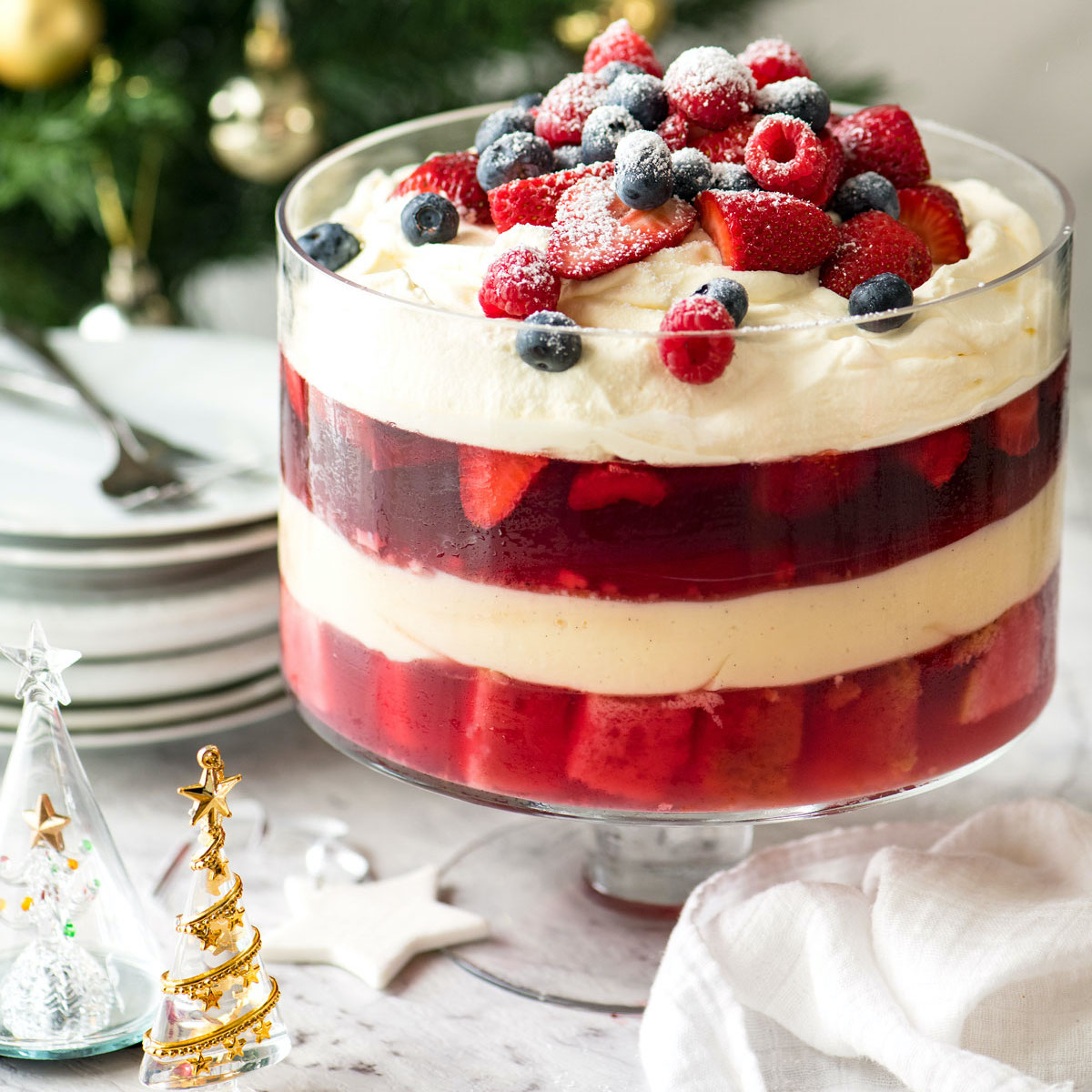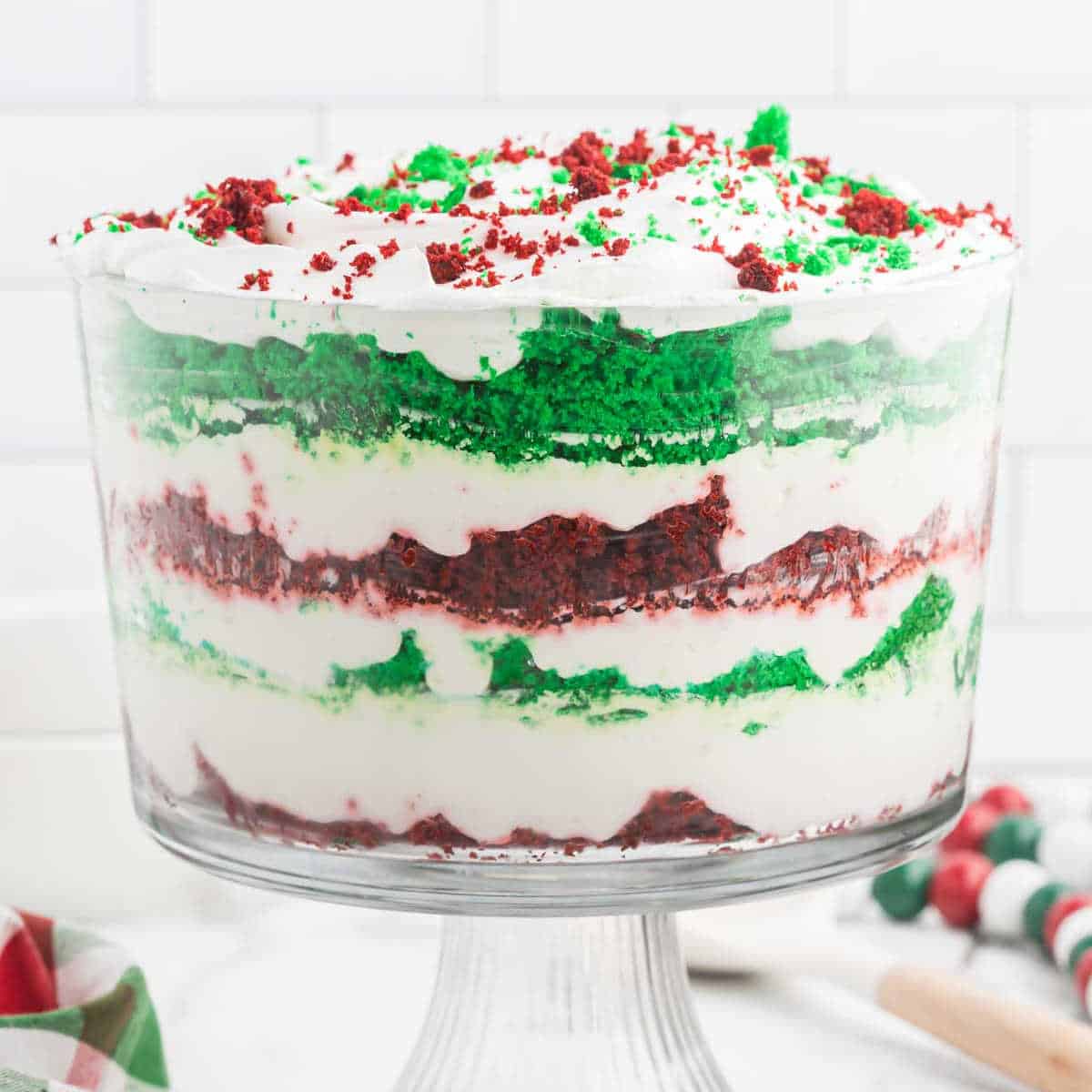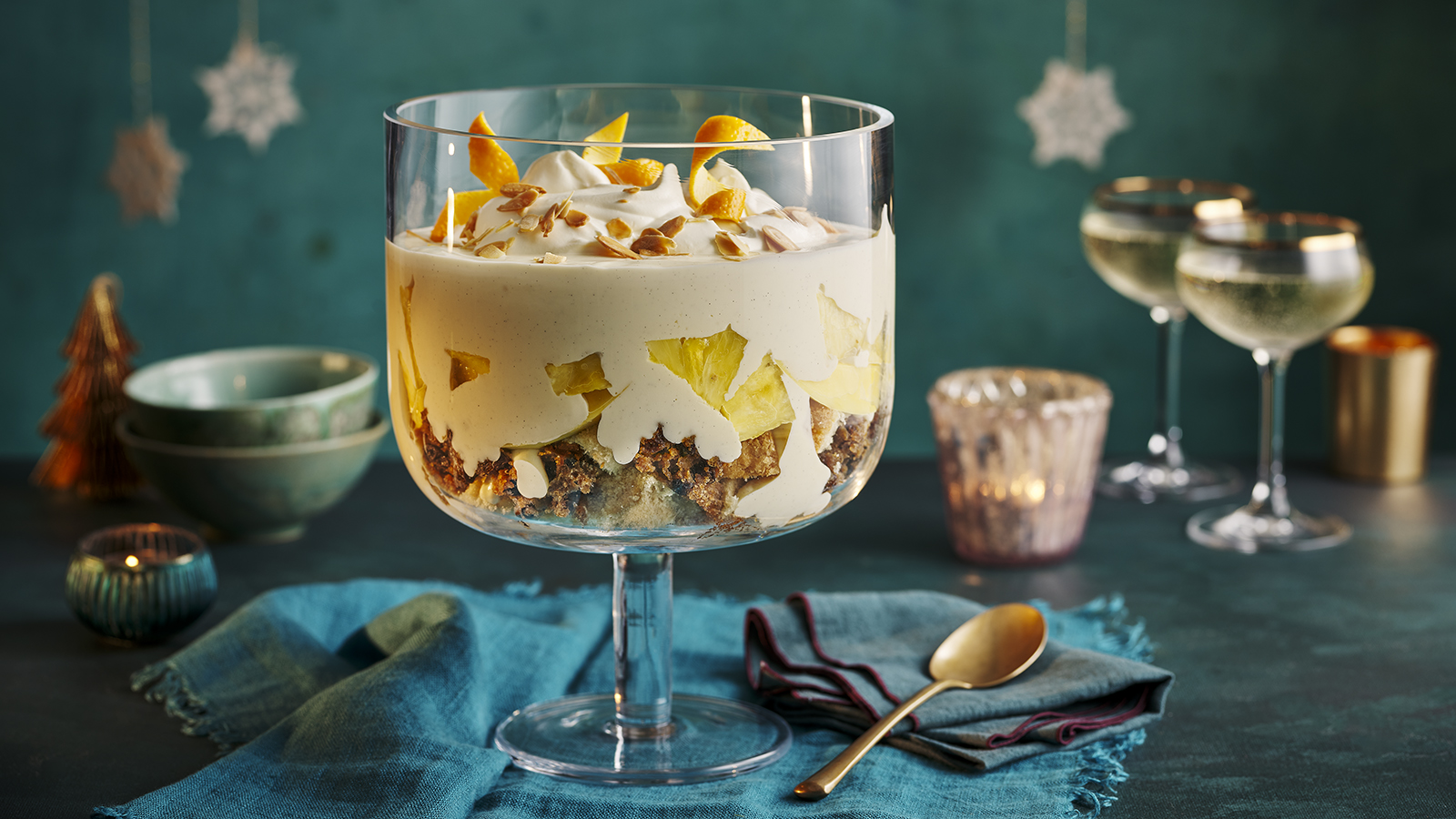Christmas Trifle - Wheat Recipes | Anson Mills - Artisan Mill Goods
Your folders
Your folders
Total: 3180
Servings: 15
Ingredients
Export 18 ingredients for grocery delivery
Instructions
Step 1
Make the pastry cream: In a medium mixing bowl, whisk together the egg yolks and 2 tablespoons of the half-and-half. Add the flour and whisk vigorously until the mixture is satiny smooth and free of lumps. In a heavy-bottomed medium saucepan, combine the remaining half-and-half, the sugar, and the salt. If using a vanilla bean, split it lengthwise, scrape the seeds into the saucepan, and drop in the pod halves. Bring the mixture to a simmer over medium-high heat, stirring occasionally with a wooden spoon to dissolve the sugar. As soon as it reaches a simmer, pull the saucepan off the burner, and, while whisking constantly, slowly drizzle the hot liquid into the yolk mixture until the saucepan is empty. Reduce the heat to medium-low, return the saucepan to the burner, and pour the warm yolk mixture back into the saucepan all at once, scraping the bowl with a rubber spatula and vigorously whisking the liquid. Whisk until the mixture thickens and bubbles burst on the surface, 20 to 30 seconds, and then allow it to bubble for 10 seconds. The pastry cream should be thick and glossy. Remove the pan from the heat and pour the pastry cream through a fine-mesh sieve set over a deep, narrow bowl, scraping the saucepan with a rubber spatula. Knock the cream through the sieve by tapping the rim of the sieve with the handle of a wooden spoon. Whisk in the cold butter and vanilla extract (if using). Press plastic wrap directly against the surface of the pastry cream and refrigerate until cold, at least 4 hours or up to overnight. Make the jelly: For molding the jelly, have ready two 8-inch round cake pans with 2-inch sides and a smaller pan or wide, shallow bowl that has a diameter similar to that of the bottom of your trifle bowl. Using a rasp-style grater, finely grate 2 tablespoons of blood orange zest (blood oranges have thin skins, so use a light touch). Turn the zest into a small bowl and set it aside. Cut the blood oranges and in half and juice them into a fine-mesh sieve set over a 1-quart liquid measuring cup; you will need 2½ cups juice. Cut the lemons in half and juice them into the sieve until you have a total of 3 cups combined juice. Pour the juice into a medium nonreactive saucepan, add the sugar, and stir until it dissolves. Sprinkle the gelatin over the surface of the liquid and let stand 5 minutes to allow the gelatin to soften. Stir again. Warm the mixture over medium heat, stirring frequently, until the gelatin fully dissolves; do not let the mixture become hotter than a medium-hot bath. Remove the pan from the heat. Add the grated zest and let infuse for 10 seconds. Strain the mixture back into the 1-quart measuring cup, and then pour the liquid jelly into the molds, filling them to an equal depth. Chill uncovered until set, at least 4 hours or up to overnight. Poach the pears: Squeeze the juice from the lemon halves into a small fine-mesh sieve set over a large bowl. Working one at a time, peel and halve the pears. Scoop out the seeds and the center “string” from each half. As they are finished, add the pear halves to the bowl and toss with the lemon juice to prevent discoloration. In a nonreactive 3-quart sauté pan, braiser, or other wide and relatively shallow pan, bring the water, sugar, and salt to a boil in over high heat, stirring once or twice to help the sugar dissolve. Add the pears and the juices to the poaching liquid. Return the liquid to a simmer, turn down the heat to low, and cover partially; the poaching liquid should bubble but be held below an outright simmer. Poach the pears until almost tender, about 10 minutes (a wooden skewer or the tip of a paring knife should meet just a little resistance when inserted into the center of a pear half). Remove the pan from the heat and let the pears cool in the poaching liquid. Cover and refrigerate until chilled, at least 4 hours or up to overnight. Make the cake: You’ll need the pans that you used as jelly molds for baking the cake. To unmold the jelly layers from the cake pans, wrap two 8-inch cardboard cake rounds tautly with plastic wrap. Invert each pan onto a prepared cake round and drape a hot, wet dishcloth over the pan to loosen the jelly. Don’t go overboard or you’ll end up with soup! Lift off the pan. Loosely cover the jelly layers with plastic wrap and refrigerate until needed. Wash and dry the cake pans. Sift the flour into the bowl of a stand mixer. Add the sugar, baking powder, and salt and whisk to combine. Cut the cold butter into little pieces, add them to the flour, and toss to coat. Set aside until the flour has lost its chill and the butter has completely softened. Place a 2-cup liquid measuring cup on a digital kitchen scale and tare the scale. Crack the whole eggs into the measuring cup and add the yolk. The mixture should weigh 4 ounces; if it weighs more, beat the eggs with a fork and pour or spoon off enough so that they weigh exactly 4 ounces. Add ¼ cup of the milk to the eggs along with the vanilla and whisk to combine. Adjust an oven rack to the lower-middle position and heat the oven to 350 degrees. Generously butter two sturdy 8-inch round cake pans with 2-inch sides. Sprinkle the pans with flour, tilt them to coat the bottom and sides, and then knock out the excess. Set the pans aside. Attach the bowl and flat beater to the mixer. Mix the butter and flour on low speed until the mixture resembles coarse crumbs (fig. 9.1), about 2 minutes. Increase the speed to medium and add the remaining milk in a steady stream. Beat for 1 minute on medium speed to develop structure. With the mixer running on medium-low speed, add the egg mixture in 3 additions, beating well and scraping down the bowl after each. As soon as all of the ingredients have been incorporated, detach the bowl from the mixer and fold the batter lightly with the rubber spatula. The batter will be smooth and shiny, and look slightly broken (fig. 9.2). Scrape the batter into the prepared pans, dividing it evenly (about 18 ounces of batter per pan), and smooth the surfaces with a small offset spatula, banking the batter slightly around the edges and leaving the center slightly depressed. Gently drop each pan on the counter to distribute the batter. Bake until the cakes are nicely risen, golden brown at the edges, and the centers spring back when touched with a finger, about 35 minutes. Let the cakes cool in their pans on a wire rack for 10 minutes, and then invert them onto the rack to cool. After the cakes have cooled for 30 minutes, turn them right side up and let cool completely, about 2 hours. Prepare the assembly mise en place: Using a long serrated knife, cut each cake into 2 layers (fig. 11.1) and set the layers aside. Wrap another 8-inch cardboard cake round tautly with plastic wrap and unmold the third jelly layer onto it in the same way you unmolded the other two. Set the jelly aside. Line a baking sheet with paper towels. Using a slotted spoon, transfer the pears from their poaching liquid to the prepared baking sheet. Cut each pear half crosswise into slices about ⅛ inch thick and set aside. Stir the chilled pastry cream and turn it into a large pastry bag fitted with a large plain tip. Alternatively, you may stir the pastry cream and use a long-handled spoon to get it into the trifle bowl. Assemble the trifle: Lay a cake round in the bottom of a 3- to 4-quart trifle bowl. Pipe or spoon a layer of pastry cream on the cake (fig. 12.1). Set the bottom jelly layer on top of the pastry cream (fig. 12.2). Arrange pear slices in overlapping layers (fig. 12.3) on top of the jelly. Repeat the layers to build the trifle, keeping the layers reasonably even, and sprinkling a few pomegranate arils hither and yon (fig. 12.4). Finish with pears around the periphery of the bowl, leaving a depression in the center for whipped cream. Cover loosely with plastic wrap and refrigerate until for up to 24 hours, until ready to serve. When you are ready to serve, in the bowl of the stand mixer fitted with the whisk attachment, whip the cream, vanilla, and sugar to soft peaks. Pipe or swirl some of the whipped cream on top of the trifle, sprinkle with a few additional pomegranates arils, and top with more whipped cream (fig. 13.1).
Step 2
9.1 9.2 11.1 12.1 12.2 12.3 12.4 13.1
Step 3
9.1 9.2
Step 5
12.1 12.2 12.3 12.4
Top similar recipes
Curated for youYour folders
 99 views
99 viewsChantilly Meringue - Recipes | Ans...
ansonmills.com
Your folders
 62 views
62 viewsMujadara - Rice Recipes | Anson Mil...
ansonmills.com
Your folders
 111 views
111 viewsBaba Ghanoush - Recipes | Anson Mi...
ansonmills.com
Your folders
 82 views
82 viewsChicken Bog - Rice Recipes | Anson ...
ansonmills.com
Your folders
 68 views
68 viewsAsparagus Gomae - Benne Recipes | ...
ansonmills.com
Your folders
 61 views
61 viewsCarolina Gold Risotto - Rice Recipe...
ansonmills.com
Your folders
 59 views
59 viewsRustic Red Fife Whole Grain Bread -...
ansonmills.com
Your folders
 65 views
65 viewsCarolina Gold Rice Grits Cakes - Ri...
ansonmills.com
Your folders
 71 views
71 viewsPosole Rojo (Pork and Hominy Stew) ...
ansonmills.com
Your folders
 84 views
84 viewsClassic Separate-Grain Carolina Gol...
ansonmills.com
Your folders

 296 views
296 viewsChristmas Trifle
allrecipes.com
5.0
(3)
15 minutes
Your folders

 371 views
371 viewsChristmas Trifle
recipetineats.com
5.0
(39)
10 minutes
Your folders

 129 views
129 viewsChristmas Trifle
eatingonadime.com
25 minutes
Your folders
 58 views
58 viewsChristmas Trifle
recipetineats.com
Your folders

 661 views
661 viewsClassic Christmas Trifle
womensweeklyfood.com.au
5 minutes
Your folders

 152 views
152 viewsChristmas Trifle Recipe
bestrecipes.com.au
4.8
(5)
Your folders

 283 views
283 viewsEnglish Christmas Trifle
whatagirleats.com
5.0
(47)
60 minutes
Your folders

 183 views
183 viewsChristmas pudding trifle
bbc.co.uk
Your folders

 123 views
123 viewsWhole Wheat Sourdough Artisan Bread
amybakesbread.com
5.0
(1)
45 minutes